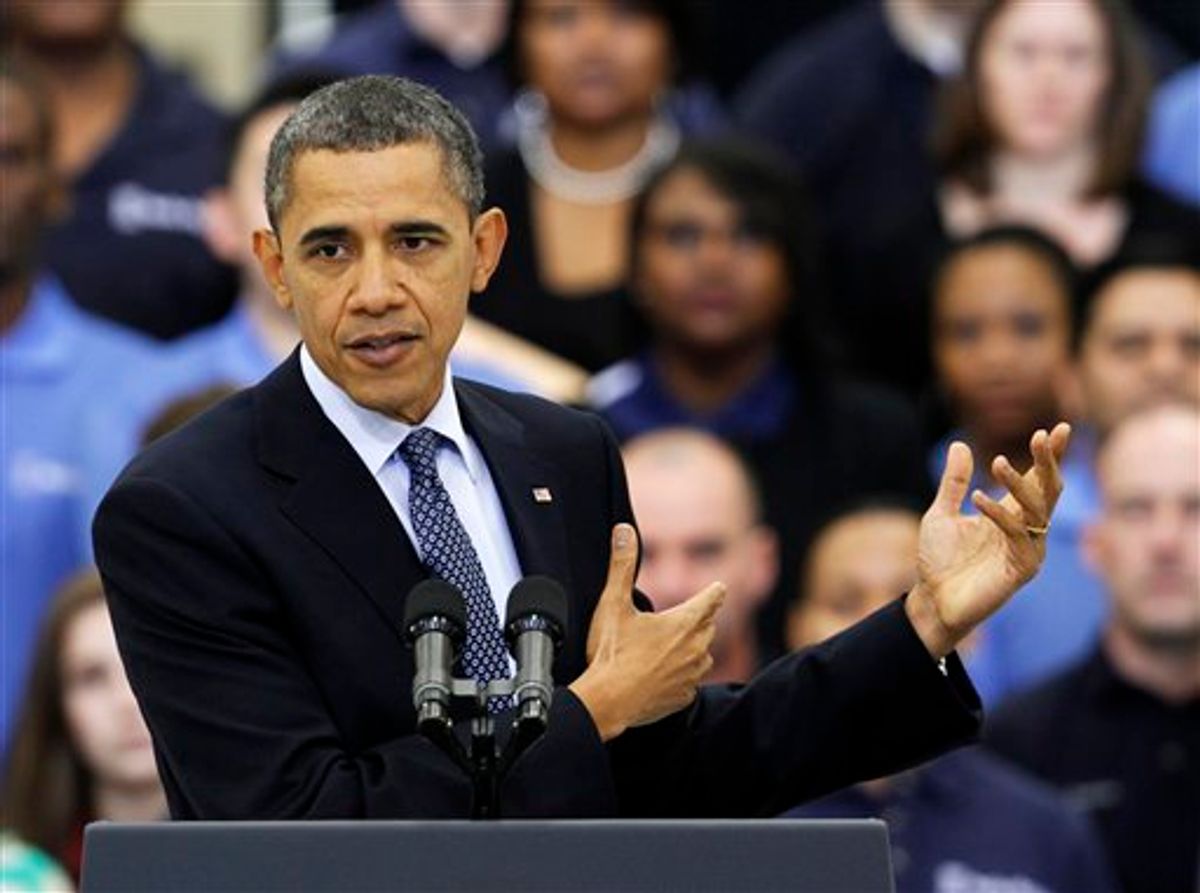When a poll showing Barack Obama’s approval rating dropping four percent was released Monday morning, it seemed reasonable to dismiss the ensuing commotion as much ado about nothing.
After all, it was just one survey, and the president’s 46 percent approval score, while down from the 50 percent he registered in the same ABC News/Washington Post poll last month, was still basically consistent with his average approval number in other recent polls.
But when the day ended with another reputable survey finding an even more dramatic decline in Obama’s standing, it became harder to deny that something was up. A month ago, the CBS News/New York Times poll gave Obama a 50 percent approval rating – his highest mark in that poll since the spring of 2010 (not counting a one-time surge last May when Osama bin Laden was killed). But now just 41 percent approve of Obama’s job performance, with 47 percent rating it unfavorably.
This would seem to throw cold water on what has been the political story of 2012: Obama’s improving reelection prospects. Each monthly jobs report has contained more encouraging news than the one before, while the GOP campaign has dragged on, exposed Mitt Romney’s vulnerabilities, and forced him ever farther to the right. So it wasn’t surprising when polls showed a noticeable uptick in Obama’s popularity, and in his standing against Romney (and other Republicans) in general election trial heats. But those gains are nowhere to be found in the new data:
And [Obama’s] weakening position cut across all major demographic groups, even among those with which he has kept an edge over his Republican challengers: women, independents, moderates, college graduates and younger voters.
There are a few possible explanations for Monday’s polling double-whammy. The one that Republicans prefer, and the Democrats hope isn’t valid, is that soaring gas prices have simply replaced soaring unemployment as the main source of voter anger toward Obama.
From their presidential candidates on down, Republicans have been pushing hard to blame the president for the cost of fuel, and the new polls suggest they’re making some headway. 65 percent of voters in the ABC/WaPo survey said they disapprove of Obama’s handling of gas prices, and more than half in the CBS/NYT poll said he has significant control over prices.
Still, it would be surprising if gas prices really are killing Obama’s poll numbers in the face of otherwise encouraging economic news. Modern presidential history suggests that fuel costs just don’t have the same direct relationship with presidential popularity as core economic indicators like unemployment and income growth. Sure, there’s the example of Jimmy Carter, who presided over the infamous gas lines of the late 1970s, which surely didn’t lift his image with the public. But inflation was soaring, unemployment was stubbornly high and the country was dealing with the humiliation of the Iranian hostage crisis when he faced the voters in 1980; there were other, more obvious, sources for his political woes than gas prices.
An alternate explanation, then, is that Monday’s bad numbers were partly the result of normal statistical deviation and partly a function of when the polls were taken. Each survey began last Wednesday, with the ABC/WaPo calling voters through Saturday and CBS/NYT staying in the field through Sunday. It’s likely that neither fully measured the impact of the jobs report that came out last Friday morning, which provided the strongest evidence yet that a real recovery is afoot, even if the actual jobless rate remained at 8.3 percent. Plus, the middle of last week was filled with ominous news about Iran and the possibility of another Middle East war, highlighted by Benjamin Netanyahu’s visit to the United States.
It may be that each poll simply began reaching voters at the worst possible time for Obama, just as the news was dominated by critical commentary of his handling of a potential foreign policy crisis and before a fresh dose of positive economic data was added to the mix.
Some other polling released Monday suggests this is possible. Gallup’s daily tracking survey, which spans the three previous days, actually showed Obama’s approval jumping to 49 percent, as high as it’s been in months, and a clear improvement from the middle of last week, when Gallup had the president at 43 percent. And Rasmussen Reports’ daily tally gave Obama a three-point boost, from 44 to 47 percent, between Sunday and Monday.
Understandably, the White House is worried about being linked too closely to cost of gas, and is now upping its damage control efforts. But as Brad Plumer notes, the real political threat to Obama may still be indirect – that high prices will leave consumers with less disposable income, thereby hurting the recovery, curtailing the public’s (slowly) growing sense of optimism, and permanently dragging Obama’s approval rating back down to fatal levels.
Monday’s polling was a reminder of how tenuous Obama’s standing really is. But it will take more than two polls on one day to establish that gas prices by themselves will be enough to sink him.



Shares